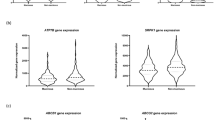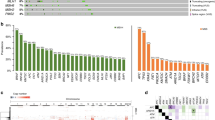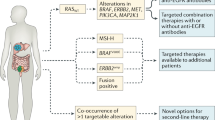Abstract
Mucinous colorectal cancer is a unique histological subtype that is known to respond poorly to cytotoxic chemotherapy and radiotherapy. There are a number of genes known to be associated with resistance to 5-fluorouracil (5-FU), oxaliplatin, and irinotecan. The aim of this study was to compare the somatic mutation frequency and copy number variation (CNV) in these genes between mucinous and non-mucinous colorectal cancer. A systematic search of PubMed was performed to identify papers investigating drug resistance in colorectal cancer. From this review, a list of 26 drug-resistance-associated genes was compiled. Using patient data from The Cancer Genome Atlas (TCGA), the somatic mutation rate and CNV was compared between patients with mucinous and non-mucinous colorectal cancer. Statistical analysis was carried out using GraphPad PRISM® version 5.00. Data were available on 531 patients (464 non-mucinous, 67 mucinous). A statistically significant difference in the somatic mutation rate between the two cohorts was identified in the TYMP (p = 0.0179), ATP7B (p = 0.0465), SRPK1 (p = 0.0135), ABCB1 (p = 0.0423), and ABCG2 (p = 0.0102) genes. A statistically significant difference in CNV was identified between the two cohorts in the GSTP1 (p = 0.0405), CCS (p = 0.0063), and TOP1 (p = 0.0048) genes. Differences in somatic mutation rate and CNV in genes associated with resistance to 5-FU, oxaliplatin, and irinotecan may partly account for the pattern of resistance observed in mucinous colorectal cancers. These genetic alterations may prove useful when deciding on a personalized approach to chemotherapy and may also represent potential therapeutic targets going forward.
This is a preview of subscription content, access via your institution
Access options
Subscribe to this journal
Receive 6 print issues and online access
$259.00 per year
only $43.17 per issue
Buy this article
- Purchase on Springer Link
- Instant access to full article PDF
Prices may be subject to local taxes which are calculated during checkout



Similar content being viewed by others
References
Kang H, O'Connell JB, Maggard MA, Sack J, Ko CY. A 10-year outcomes evaluation of mucinous and signet-ring cell carcinoma of the colon and rectum. Dis Colon Rectum. 2005;48:1161–8.
You YN, Xing Y, Feig BW, Chang GJ, Cormier JN. Young-onset colorectal cancer: is it time to pay attention? Arch Intern Med. 2012;172:287–9.
Hamilton SR, Aaltonen LA, eds. World Health Organization Classification of Tumours. Lyon, France: IARC Press; 2000.
McCawley N, Clancy C, O'Neill BD, Deasy J, McNamara DA, Burke JP. Mucinous rectal adenocarcinoma is associated with a poor response to neoadjuvant chemoradiotherapy: a systematic review and meta-analysis. Dis Colon Rectum. 2016;59:1200–8.
Debunne H, Ceelen W. Mucinous differentiation in colorectal cancer: molecular, histological and clinical aspects. Acta Chirurgica Belgica. 2013;113:385–90.
Reynolds IS, Furney SJ, Kay EW, McNamara DA, Prehn JHM, Burke JP. Meta-analysis of the molecular associations of mucinous colorectal cancer. Br J Surg. 2019;106:682–91.
Glasgow SC, Yu J, Carvalho LP, Shannon WD, Fleshman JW, McLeod HL. Unfavourable expression of pharmacologic markers in mucinous colorectal cancer. Br J Cancer. 2005;92:259–64.
Yan D, Tu L, Yuan H, Fang J, Cheng L, Zheng X, et al. WBSCR22 confers oxaliplatin resistance in human colorectal cancer. Sci Rep. 2017;7:15443.
Yoo BK, Gredler R, Vozhilla N, Su ZZ, Chen D, Forcier T, et al. Identification of genes conferring resistance to 5-fluorouracil. PNAS. 2009;106:12938–43.
Martinez-Balibrea E, Martinez-Cardus A, Gines A, Ruiz de Porras V, Moutinho C, Layos L, et al. Tumor-related molecular mechanisms of oxaliplatin resistance. Mol Cancer Therapeutics. 2015;14:1767–76.
Sui X, Kong N, Wang X, Fang Y, Hu X, Xu Y, et al. JNK confers 5-fluorouracil resistance in p53-deficient and mutant p53-expressing colon cancer cells by inducing survival autophagy. Sci Rep. 2014;4:4694.
Saleh EM, El-Awady RA, Anis N. Predictive markers for the response to 5-fluorouracil therapy in cancer cells: constant-field gel electrophoresis as a tool for prediction of response to 5-fluorouracil-based chemotherapy. Oncol Lett. 2013;5:321–7.
Plasencia C, Martinez-Balibrea E, Martinez-Cardus A, Quinn DI, Abad A, Neamati N. Expression analysis of genes involved in oxaliplatin response and development of oxaliplatin-resistant HT29 colon cancer cells. Int J Oncol. 2006;29:225–35.
Ab Mutalib NS, Md Yusof NF, Abdul SN, Jamal R. Pharmacogenomics DNA biomarkers in colorectal cancer: current update. Front Pharmacol. 2017;8:736.
Love MI, Huber W, Anders S. Moderated estimation of fold change and dispersion for RNA-seq data with DESeq2. Genome Biol 2014;15:550.
Schmoll HJ, Van Cutsem E, Stein A, Valentini V, Glimelius B, Haustermans K, et al. ESMO consensus guidelines for management of patients with colon and rectal cancer. a personalized approach to clinical decision making. Ann Oncol Off J Eur Soc Med Oncol. 2012;23:2479–516.
Parker WB, Cheng YC. Metabolism and mechanism of action of 5-fluorouracil. Pharmacol Therapeutics. 1990;48:381–95.
Longley DB, Latif T, Boyer J, Allen WL, Maxwell PJ, Johnston PG. The interaction of thymidylate synthase expression with p53-regulated signaling pathways in tumor cells. Semin Oncol. 2003;30(3 Suppl 6):3–9.
An Q, Robins P, Lindahl T, Barnes DE. 5-Fluorouracil incorporated into DNA is excised by the Smug1 DNA glycosylase to reduce drug cytotoxicity. Cancer Res 2007;67:940–5.
Longley DB, Harkin DP, Johnston PG. 5-fluorouracil: mechanisms of action and clinical strategies. Nat Rev Cancer. 2003;3:330–8.
Evrard A, Cuq P, Ciccolini J, Vian L, Cano JP. Increased cytotoxicity and bystander effect of 5-fluorouracil and 5-deoxy-5-fluorouridine in human colorectal cancer cells transfected with thymidine phosphorylase. Br J Cancer. 1999;80:1726–33.
Burger H, Loos WJ, Eechoute K, Verweij J, Mathijssen RH, Wiemer EA. Drug transporters of platinum-based anticancer agents and their clinical significance. Drug Resistance Updates. 2011;14:22–34.
Graham MA, Lockwood GF, Greenslade D, Brienza S, Bayssas M, Gamelin E. Clinical pharmacokinetics of oxaliplatin: a critical review. Clin Cancer Res. 2000;6:1205–18.
Woynarowski JM, Faivre S, Herzig MC, Arnett B, Chapman WG, Trevino AV, et al. Oxaliplatin-induced damage of cellular DNA. Mol Pharm. 2000;58:920–7.
Howell SB, Safaei R, Larson CA, Sailor MJ. Copper transporters and the cellular pharmacology of the platinum-containing cancer drugs. Mol Pharm. 2010;77:887–94.
Samimi G, Katano K, Holzer AK, Safaei R, Howell SB. Modulation of the cellular pharmacology of cisplatin and its analogs by the copper exporters ATP7A and ATP7B. Mol Pharm. 2004;66:25–32.
Tsuchida S, Sato K. Glutathione transferases and cancer. Crit Rev Biochem Mol Biol. 1992;27:337–84.
Yeakley JM, Tronchere H, Olesen J, Dyck JA, Wang HY, Fu XD. Phosphorylation regulates in vivo interaction and molecular targeting of serine/arginine-rich pre-mRNA splicing factors. J Cell Biol. 1999;145:447–55.
Schenk PW, Stoop H, Bokemeyer C, Mayer F, Stoter G, Oosterhuis JW, et al. Resistance to platinum-containing chemotherapy in testicular germ cell tumors is associated with downregulation of the protein kinase SRPK1. Neoplasia. 2004;6:297–301.
Wu MH, Yan B, Humerickhouse R, Dolan ME. Irinotecan activation by human carboxylesterases in colorectal adenocarcinoma cells. Clinical cancer research: an official journal of the American Association for. Cancer Res. 2002;8:2696–700.
Braun MS, Richman SD, Quirke P, Daly C, Adlard JW, Elliott F, et al. Predictive biomarkers of chemotherapy efficacy in colorectal cancer: results from the UK MRC FOCUS trial. J Clin Oncol. 2008;26:2690–8.
Xu Y, Villalona-Calero MA. Irinotecan: mechanisms of tumor resistance and novel strategies for modulating its activity. Ann Oncol 2002;13:1841–51.
Patel J, Mitra AK. Strategies to overcome simultaneous P-glycoprotein mediated efflux and CYP3A4 mediated metabolism of drugs. Pharmacogenomics. 2001;2:401–15.
Gottesman MM, Fojo T, Bates SE. Multidrug resistance in cancer: role of ATP-dependent transporters. Nat Rev Cancer. 2002;2:48–58.
Wierdl M, Wall A, Morton CL, Sampath J, Danks MK, Schuetz JD, et al. Carboxylesterase-mediated sensitization of human tumor cells to CPT-11 cannot override ABCG2-mediated drug resistance. Mol Pharm. 2003;64:279–88.
Funding
Study concept and design—DAM, JPB, JHMP. Study Materials—ISR, EO. Data Collection—ISR, SJF. Data Analysis—ISR, SJF, JPB.
Author information
Authors and Affiliations
Contributions
Funding for this project was provided by the Beaumont Hospital Colorectal Research Fund & Science Foundation Ireland (15/ERACSM/3268).
Corresponding authors
Ethics declarations
Conflict of interest
The authors declare that they have no conflict of interest.
Additional information
Publisher’s note Springer Nature remains neutral with regard to jurisdictional claims in published maps and institutional affiliations.
Rights and permissions
About this article
Cite this article
Reynolds, I.S., O’Connell, E., Fichtner, M. et al. Mucinous adenocarcinoma is a pharmacogenomically distinct subtype of colorectal cancer. Pharmacogenomics J 20, 524–532 (2020). https://doi.org/10.1038/s41397-019-0137-6
Received:
Revised:
Accepted:
Published:
Issue Date:
DOI: https://doi.org/10.1038/s41397-019-0137-6
This article is cited by
-
Identification and validation of a novel six-gene signature based on mucinous adenocarcinoma-related gene molecular typing in colorectal cancer
Discover Oncology (2024)
-
Interaction analysis of high-risk pathological features on adjuvant chemotherapy survival benefit in stage II colon cancer patients: a multi-center, retrospective study
BMC Cancer (2023)
-
Adjuvant Radiotherapy Is Not Necessary for Stage III Mucinous Rectal Cancer: Evidence Based on Long Survival Analysis from SEER Data
Journal of Gastrointestinal Surgery (2023)
-
Serine-Arginine Protein Kinase 1 (SRPK1): a systematic review of its multimodal role in oncogenesis
Molecular and Cellular Biochemistry (2022)
-
Radiomics and machine learning analysis based on magnetic resonance imaging in the assessment of liver mucinous colorectal metastases
La radiologia medica (2022)



